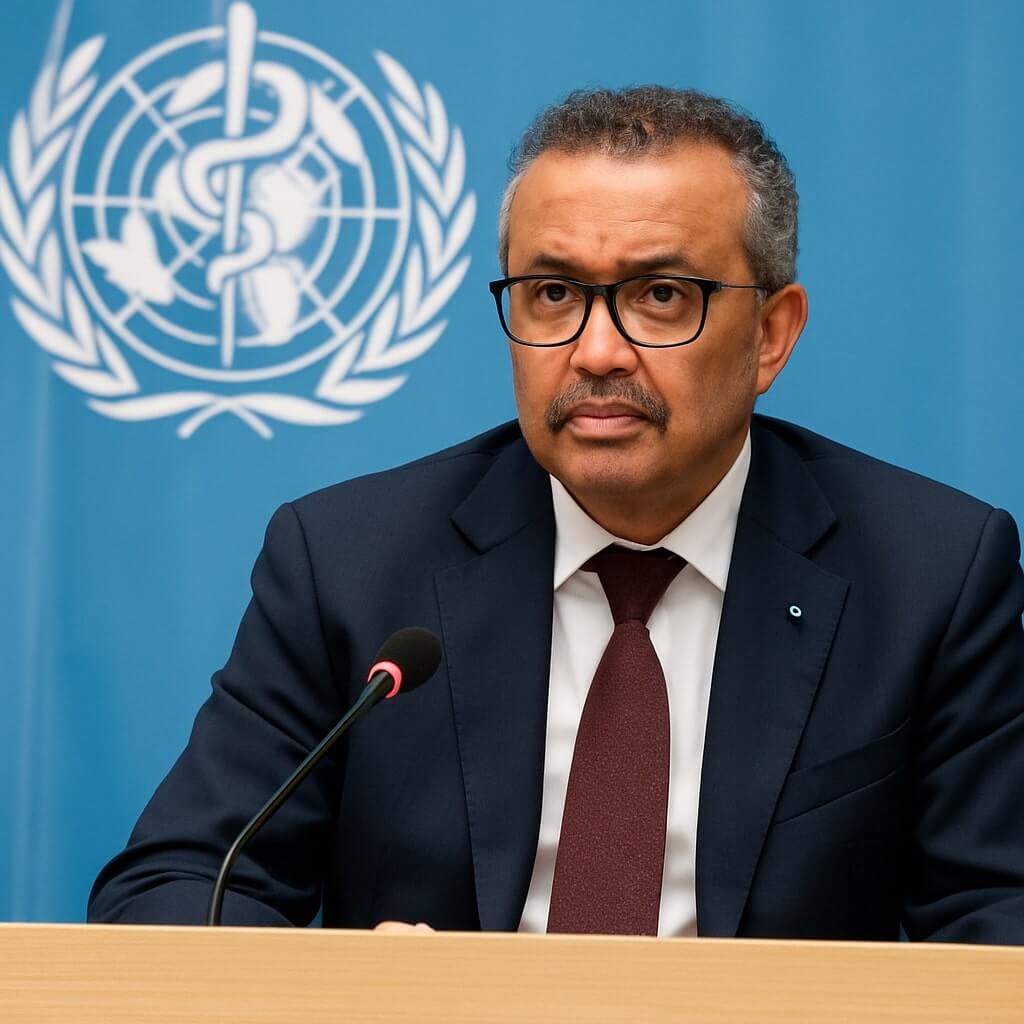When you consider the role of the Director General of the World Health Organization, it’s clear that their responsibilities are multifaceted and critical to global health. From leading initiatives to coordinating emergency responses, their impact is far-reaching. They also focus on developing policies that promote health equity and strengthen healthcare systems. However, the complexities of international collaboration and resource mobilization reveal challenges that warrant deeper exploration. What strategies are most effective in achieving these goals?
Key Takeaways
- Provides strategic leadership for global health initiatives, addressing pandemics and promoting health equity worldwide.
- Coordinates responses during health emergencies, ensuring effective collaboration among member states and health organizations.
- Develops and advocates for evidence-based health policies aligned with global health goals.
- Strengthens health systems by promoting universal health coverage and enhancing workforce capacity.
- Mobilizes resources and monitors health programs to ensure accountability and measure progress towards health improvements.
Leadership in Global Health Initiatives
As the Director General of WHO, you play a pivotal role in steering global health initiatives, particularly when it comes to addressing pressing health challenges like pandemics or disease outbreaks.
Your leadership hinges on effective global health diplomacy, allowing you to navigate complex political landscapes and foster collaboration among nations. By forming strategic health partnerships, you mobilize resources and expertise, ensuring that interventions are both timely and impactful.
You prioritize data-driven approaches, utilizing evidence to inform policies and actions. Your ability to unite stakeholders under a common agenda is essential for advancing global health equity and improving health outcomes worldwide.
Coordination During Health Emergencies
While steering health emergencies, your role as Director General of WHO is essential for guaranteeing swift and effective coordination among member states and health organizations.
You must focus on crisis management and emergency preparedness, facilitating communication and collaboration to tackle outbreaks and other health threats.
By coordinating resources, sharing critical information, and deploying rapid response teams, you help nations stabilize their health systems during crises.
This coordination not only enhances immediate responses but also strengthens global health infrastructure for future emergencies.
Ultimately, your leadership guarantees that collective efforts effectively mitigate risks and improve health outcomes worldwide.
Policy Development and Advocacy
In your role as Director General of WHO, you drive the development of policies that shape global health strategies and priorities.
You focus on creating evidence-based policies that address pressing health challenges, ensuring that decisions are rooted in solid research and data.
By engaging with member states and stakeholders, you advocate for global health initiatives that promote equity and accessibility.
Your leadership is essential in fostering collaboration across sectors, amplifying the voice of public health, and mobilizing resources.
Ultimately, your commitment to global health advocacy helps to create a healthier, more resilient world for everyone.
Strengthening Health Systems
To strengthen health systems, you need to prioritize promoting universal health coverage, ensuring that everyone has access to essential services.
Enhancing health workforce capacity is vital, as it directly impacts the effectiveness of care delivery.
Additionally, building resilient health infrastructure will better prepare systems to withstand crises and respond to emerging health challenges.
Promoting Universal Health Coverage
As the world grapples with health disparities, promoting universal health coverage (UHC) becomes essential to strengthening health systems. UHC guarantees universal access to crucial health services, reducing inequities in health outcomes. Effective health financing mechanisms are imperative for sustainable UHC, allowing countries to invest in necessary infrastructure and services.
| Key Aspect | Description | Impact |
|---|---|---|
| Universal Access | Guarantees everyone can receive care | Reduces health disparities |
| Health Financing | Funds system improvements | Enhances service availability |
| Policy Implementation | Enforces UHC strategies | Promotes equitable health access |
| Stakeholder Engagement | Involves communities | Increases program effectiveness |
| Monitoring & Evaluation | Assesses UHC progress | Informs future health policies |
Enhancing Health Workforce Capacity
Strengthening the health workforce is essential for achieving efficient health systems and improving overall health outcomes.
To do this effectively, you need to prioritize workforce training and skill development. Investing in continuous professional education guarantees that healthcare providers stay updated with the latest practices and technologies. This not only enhances their competencies but also boosts their confidence in delivering quality care.
Evidence shows that well-trained health workers markedly reduce morbidity and mortality rates. By fostering an adaptable workforce, you can address emerging health challenges and meet the needs of diverse populations, ultimately contributing to a more resilient health system.
Strengthening Health Infrastructure Resilience
While many factors contribute to effective health systems, resilient health infrastructure stands out as a fundamental pillar.
You need to prioritize resilience strategies that enhance the ability of health infrastructure to withstand shocks, whether from pandemics or natural disasters. Investing in robust facilities, technology, and supply chains is essential.
Additionally, integrating community engagement guarantees that health systems reflect local needs and can adapt swiftly in crises. By fostering collaboration across sectors, you can strengthen the entire health ecosystem.
Ultimately, a resilient health infrastructure not only protects public health but also promotes equity and efficiency in healthcare delivery.
Promoting Health Equity and Access
Promoting health equity and access is essential for the World Health Organization (WHO) to fulfill its mission of guaranteeing that every individual can achieve their highest possible level of health.
To effectively address health disparities and guarantee equitable access, the Director General focuses on:
- Identifying and analyzing health disparities among populations.
- Advocating for policies that promote universal health coverage.
- Strengthening community engagement to tailor solutions to local needs.
- Collaborating with governments and organizations to allocate resources equitably.
Fostering International Collaboration and Partnerships
As the Director General of WHO, you play an essential role in building global health networks that enhance collaboration among countries.
By strengthening collaborative initiatives, you can address health challenges more effectively and mobilize resources where they’re needed most.
This approach not only fosters innovation but also guarantees a unified response to public health crises.
Building Global Health Networks
Building global health networks is essential for enhancing international collaboration and partnerships, enabling countries to share resources, knowledge, and best practices in addressing health challenges.
Effective network building involves:
- Establishing robust communication channels among stakeholders.
- Engaging in joint research initiatives to tackle emerging health threats.
- Facilitating training programs to strengthen local health capacities.
- Promoting policy coherence across different nations to align health objectives.
These actions foster global partnerships that are vital for a coordinated response to health crises, ensuring that countries can leverage each other’s strengths and experiences in a rapidly changing health landscape.
Strengthening Collaborative Initiatives
Strengthening collaborative initiatives plays an essential role in fostering international partnerships that enhance global health outcomes.
By promoting collaborative research, you’re able to tap into diverse expertise and innovative solutions, addressing health challenges more effectively. Joint funding initiatives can greatly amplify resources, allowing for thorough projects that might otherwise remain unfunded.
This approach not only distributes the financial burden but also encourages shared accountability and transparency among nations. As you work towards these goals, you’ll create a robust framework that supports sustainable health improvements, ensuring that all stakeholders contribute to and benefit from advancements in global health.
Conclusion
In conclusion, the Director General of the WHO plays a crucial role in shaping global health. By leading initiatives, coordinating emergency responses, and advocating for equitable health access, they drive significant change. Their focus on policy development and international collaboration strengthens health systems worldwide. Ultimately, effective leadership in these areas is essential for addressing global health challenges and ensuring a healthier future for all, highlighting the importance of the WHO’s mission in fostering global well-being.




